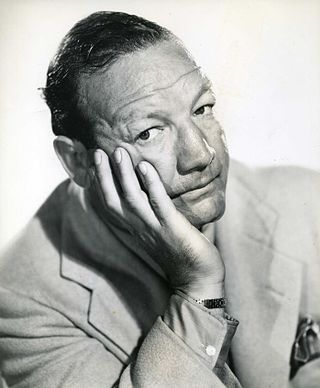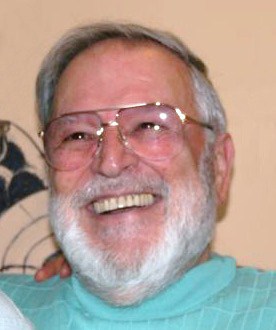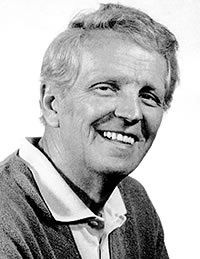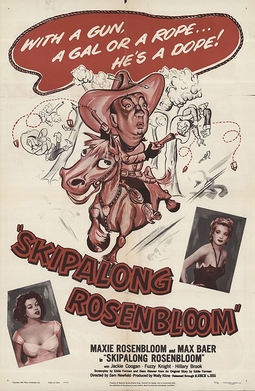Related Research Articles

Rodney Sturt Taylor was an Australian actor. He appeared in more than 50 feature films, including Young Cassidy (1965), Nobody Runs Forever (1968), The Train Robbers (1973) and A Matter of Wife... and Death (1975).

Max Everitt Rosenbloom was an American professional boxer, actor, and television personality. Nicknamed "Slapsie Maxie", he was inducted into The Ring's Boxing Hall of Fame in 1972, the International Jewish Sports Hall of Fame in 1984, the World Boxing Hall of Fame in 1985, and the International Boxing Hall of Fame in 1993. He was sometimes billed as Slapsie Maxie Rosenbloom for film appearances.

Percy Faith was a Canadian–American bandleader, orchestrator, composer and conductor, known for his lush arrangements of instrumental ballads and Christmas standards. He is often credited with popularizing the "easy listening" or "mood music" format. He became a staple of American popular music in the 1950s and continued well into the 1960s. Although his professional orchestra-leading career began at the height of the swing era, he refined and rethought orchestration techniques, including use of large string sections, to soften and fill out the brass-dominated popular music of the 1940s.

John Victor Romita was an American comic book artist best known for his work on Marvel Comics' The Amazing Spider-Man and for co-creating characters including Mary Jane Watson, the Punisher, Kingpin, Wolverine, and Luke Cage. Romita was the father of John Romita Jr., also a comic book artist, and the husband of Virginia Romita, who was for many years Marvel's traffic manager.

Laurence Naismith was an English actor. He made numerous film and television appearances, including starring roles in the musical films Scrooge (1970) and the children's ghost film The Amazing Mr. Blunden (1972). He also had memorable roles as Captain Edward Smith of the RMS Titanic in A Night to Remember (1958), the First Sea Lord in Sink the Bismarck! (1960), and Argus in Jason and the Argonauts (1963).

Sam Katzman was an American film producer and director. Katzman's specialty was producing low-budget genre films, including serials, which had disproportionately high returns for the studios and his financial backers.

Joan Evans was an American film actress known for Roseanna McCoy, Skirts Ahoy! and co-starred with Audie Murphy in the movie, Column South. She was married to Kirby Weatherly in August 1952.

Rossano Brazzi was an Italian actor. He moved to Hollywood in 1948 and was propelled to international fame with his role in the English-language film Three Coins in the Fountain (1954), followed by the leading male role in David Lean's Summertime (1955), opposite Katharine Hepburn. In 1958, he played the lead as Frenchman Emile De Becque in the Rodgers and Hammerstein musical South Pacific. His other notable English-language films include The Barefoot Contessa (1954), The Story of Esther Costello (1957), opposite Joan Crawford, Count Your Blessings (1959), Light in the Piazza (1962), and The Italian Job (1969).

George Tuska, who early in his career used a variety of pen names including Carl Larson, was an American comic book and newspaper comic strip artist best known for his 1940s work on various Captain Marvel titles and the crime fiction series Crime Does Not Pay and for his 1960s work illustrating Iron Man and other Marvel Comics characters. He also drew the DC Comics newspaper comic strip The World's Greatest Superheroes from 1978–1982.

Angélica María Hartman Ortiz, known professionally as La novia de Mexico, is a Mexican actress and singer. Her songs El hombre de mi vida peaked at No. 6, Reina Y Cenicienta peaked at No. 9, Prohibido (Prohibited) peaked at No. 13, and El Taconazo peaked at No. 34 on the hot Latin songs chart.
Sam Newfield, born Samuel Neufeld, also known as Sherman Scott or Peter Stewart, was an American director, one of the most prolific in American film history—he is credited with directing over 250 feature films in a career which began during the silent era and ended in 1958. In addition to his staggering feature output, he also directed one- and two-reel comedy shorts, training films, industrial films, TV episodes and pretty much anything anyone would pay him for. Because of this massive output—he would sometimes direct more than 20 films in a single year—he has been called the most prolific director of the sound era.

Raymond William Hatton was an American film actor who appeared in almost 500 motion pictures.

Mary Murphy was an American film and television actress of the 1950s, 1960s and 1970s.

Robert Strauss was an American actor. He became most familiar in Hollywood films of the 1950s such as Stalag 17 (1953), for which he was nominated for an Academy Award in the category of Best Supporting Actor.

Rosemarie Bowe Stack was an American model, best known for her appearances in several films in the 1950s.

Ron Ormond was an American author, showman, screenwriter, film producer, and film director of Western, musical, and exploitation films. Following his survival of a 1968 plane crash, Ormond began making Christian films.
Jacqueline Audry was a French film director who began making films in post-World War II France and specialised in literary adaptations. She was the first commercially successful female director of post-war France.
Franco Balducci was an Italian film actor. He appeared in 75 films between 1947 and 1978. He was born in Umbria, Italy.
Angela Stevens was an American film actress and singer.

Skipalong Rosenbloom is a 1951 American Western film directed by Sam Newfield and written by Eddie Forman and Dean Riesner. Starring Max Rosenbloom, Max Baer, Jackie Coogan, Fuzzy Knight, Hillary Brooke and Jacqueline Fontaine, it was released on April 30, 1951, by United Artists.
References
- ↑ "'Outlaw Gal' of movies to sing in Zephyr Room". The Shreveport Journal. 27 November 1952. Retrieved 24 October 2023.
- ↑ "Former Joyce Romeo a hit in the Far West". Kenosha News. 1 December 1954. Retrieved 24 October 2023.
- ↑ Daniel, Blum (1969). "Skipalong Rosenbloom". Screen World . 3. Biblo & Tannen Publishers: 133. Retrieved 16 January 2023.
- ↑ "Night Club Reviews". Billboard . Nielsen Business Media, Inc. 4 November 1944. p. 26. Retrieved 16 January 2023.
- ↑ "1930 United States Federal Census". Ancestry. Retrieved 24 October 2023.
- ↑ "Joyce Romeo is 'Discovered' by vacationing producer". Kenosha News . 24 October 1951. Retrieved 24 October 2023.
- ↑ Atkinson, Barry. Six-Gun Law - Westerns of the 1950s: The Classic Years. Midnight Marquee & BearManor Media. Retrieved 16 January 2023.
- ↑ Cowie, Peter; Elley, Derek (1977). World Filmography: 1967. Fairleigh Dickinson University Press. p. 578. ISBN 978-0-498-01565-6 . Retrieved 16 January 2023.